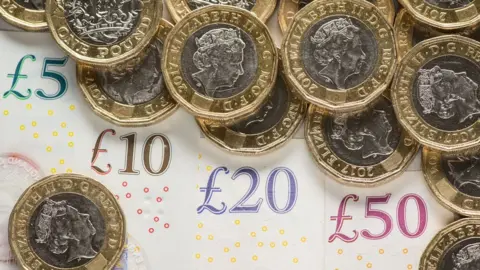NI economy 'to contract by 11% in 2020'
 PA Media
PA MediaRising numbers of Covid-19 cases and the end of the Brexit transition period may hold back NI's economic recovery, according to forecasts by Danske Bank.
It predicts the NI economy will contract by about 11% in 2020 and grow by about 7% in 2021.
It says accommodation and food services will be the hardest hit sector in 2020 with output estimated to fall by 37%.
Activity in the arts and entertainment sector is expected to fall 26% in 2020.
Despite unprecedented levels of government support to try to minimise redundancies, Danske Bank still expects significant job losses in some sectors.
For example, it is forecasting employment levels in accommodation and food services will fall by 8% and a fall of almost 6% in arts, entertainment and recreation.
While this report says the coronavirus pandemic remains the most significant risk facing the economy, it also raises concerns about the ongoing Brexit negotiations.
 Reuters
ReutersThis forecast says if no trade deal is reached, the pace of economic recovery in both Northern Ireland and the UK would be slower.
Danske Bank Chief Economist Conor Lambe said: "The economic recovery now appears to be under way in Northern Ireland and we expect the third quarter output data to show a reasonably strong increase in activity.
"But most of the initial gains from re-opening the economy after lockdown are now behind us, and with recent rises in the number of Covid-19 cases and the need for tougher restrictions to be imposed, we expect economic growth rates to begin to moderate in the final quarter of the year."
Mr Lambe added that "the end of the Brexit transition period is also expected to impact the pace of the economic recovery".
"We continue to believe that the UK and the EU will agree and implement the terms of a new free trade deal from January 2021, at which point the Northern Ireland Protocol will also take effect," he said.
"However, some trade frictions are still likely to be introduced when the transition period ends.
"It is clear that there are a number of headwinds facing the local economy and despite our relatively strong annual growth forecast for next year, economic output is still expected to be around 3 - 4% below its pre-coronavirus level in the final quarter of 2021."
